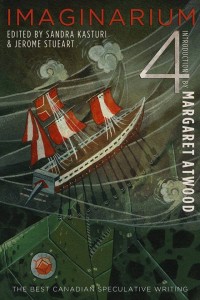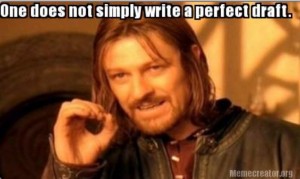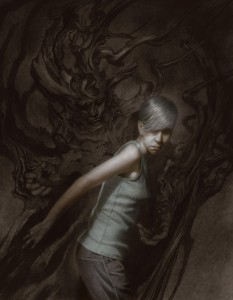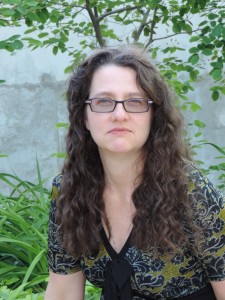 Kelly Robson’s first fiction publications appeared this year in Clarkesworld, Tor.com, Asimov’s, and the anthology New Canadian Noir
Kelly Robson’s first fiction publications appeared this year in Clarkesworld, Tor.com, Asimov’s, and the anthology New Canadian Noir. She spent four years living a weird alternate life as the wine and spirits columnist for Canada’s largest women’s magazine. She’s @kellyoyo on Twitter, and her website is at http://kellyrobson.com/.
I asked her the same questions I put to the rest of the lovely folk who agreed to this run of interviews.
Is there a literary heroine on whom you imprinted as a child? A first love, a person you wanted to become as an adult, a heroic girl or woman you pretended to be on the playground at recess? Who was she?
Nancy Drew, Nancy Drew, Nancy Drew.
I’m sorry, is there anyone else?
Can you remember what it was she did or what qualities she had that captured your affections and your imagination so strongly?
I am blessed/cursed with vivid memories of my childhood, so yes, I sure can remember.
At the age of seven I had no real books, just a few picture books I’d long grown out of. I was a precocious reader but my parents were too caught up with the implosion of their marriage to realize I was starving for reading material.
Mom did occasionally take me to the library but she kept me in the little kids section. I vividly remember bringing stacks of picture books home, burning through them in 20 minutes, and then having nothing satisfying to read.
At some point my Dad and I went into the city – probably to take to the ophthalmologist – and we stayed with my Auntie Amy. I found three Nancy Drew books in her basement rec room. They were The Secret of Shadow Ranch, The Mystery of the 99 Steps
, and The Secret of the Old Clock
.
I started with The Secret of Shadow Ranch. It was a transcendent experience — I fell into it like a hallucinogen. In this book, Nancy is knitting a sweater for Ned. I didn’t know who Ned was, so I imagined he was a kid my age, because then he and I could be friends and that would get me access to Nancy.
Auntie Amy let me take the books home. A million thanks to wonderful aunties! Mom thought Nancy Drew was too old for me (my mom was always invested in keeping me young). Dad never liked to see me reading. I don’t think they ever took books away once I got my hands on them, but they never helped me get any, either. To this day, access to books remains one of my hot button issues.
I could go on, but we were talking about Nancy.
She’s the perfect wish-fulfillment heroine: Not an adult but certainly not a kid. Completely independent emotionally, intellectually, financially, socially, and physically. Nothing is denied her. She can go anywhere, do anything. For me, Nancy was a drug.
How does she compare to the female characters in your work? Is she their literary ancestor? Do they rebel against all she stands for? What might your creations owe her?
Nancy isn’t in anything I’ve written so far, but she does figure into some work I have planned, about characters who’ve been in my head a long while. The less said about them now, the better.
I’m interested in characters who, like Nancy Drew, have everything. What can and can’t they do with that power and privilege? How far will it take them? What barriers can’t be crossed?
I’m not interested in the person who comes up from nothing to achieve much. I’m interested in the person who has it all and finds out how little it does for them.
How do you feel about the word heroine? In these posts, I am specifically looking for female authors’ female influences, whether they’re other writers or Anne of Green Gables. Does the word heroine have a purpose that isn’t served by equally well by hero?
The term hero is no longer clearly gendered the way prince and princess are. It doesn’t require alteration the way fireman and chairman do. Hero is often a gender neutral term, much like actor.
If you asked me about my favourite hero, would probably have interpreted it as gender neutral and (being who I am) I’d probably have assumed you meant superhero. But since you asked about my favourite heroine, I understood your meaning completely.
I think heroine is a useful word that drills down to a specific meaning without contortions. Let’s not get rid of useful words.
_________________________
About this post: The Heroine Question is my name for a series of short interviews with female writers about their favorite characters and literary influences. Clicking the link will take you to all the other interviews, with awesome people like Charlene Challenger, Gemma Files, Caitlin Sweet, and Jessica Reisman.
Also about this post: As I have mentioned, writer Alex Bledsoe recently asked about my use of the gendered word, heroine, in this series. I could have gone with hero, true, or “female heroes” since I was looking for women authors’ female influences. To be honest, my initial inspiration came from my ever-mature desire to make tacky-sounding drug jokes: Gemma Files on Heroin! Oops! Heroine! That kind of thing.
I hope to get up a post that takes the answer further than “I pun, therefore I am.” And I have folded a question about this word into the later interviews; you can see Kelly’s answer here.







